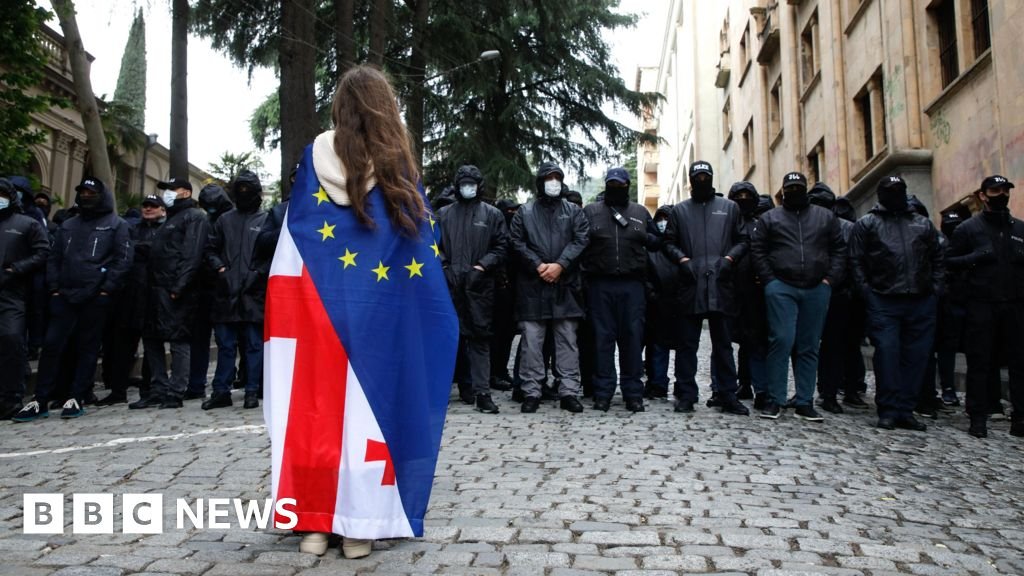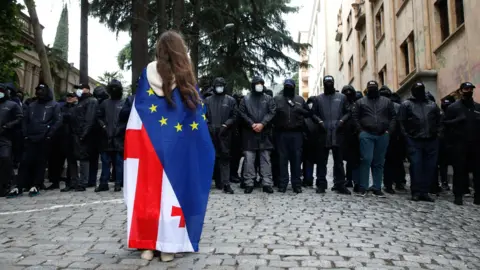 EPA
EPATwo countries, Moldova and Georgia, hold pivotal votes in the coming days that will decide their future path in Europe.
Both have felt the shadow of Russia’s war in Ukraine, and both are former Soviet republics.
While Moldova’s pro-EU president Maia Sandu is favourite to win and talks have begun on joining the European Union, the government in Georgia has been accused of “democratic backsliding” and turning away from Europe.
Moldova’s twin vote
Moldovans go to the polls on Sunday in a referendum on enshrining Moldova’s path to EU membership in the constitution – alongside the presidential election.
A Yes vote would consolidate Moldova’s status as a pro-Western, EU-facing country. It would also mean Moldova having to set out on a long path of democratic and judicial reforms to ensure it adheres to EU standards.
A survey last month suggested more than 63% of voters would back the Yes campaign. However, many in the pro-European camp have denounced what they say are Russian efforts to spread disinformation and influence the vote.
Moldova’s population is just over 2.5 million, while 1.2 million Moldovans live abroad.
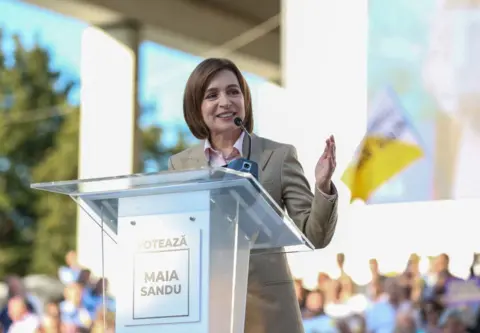 Getty Images
Getty ImagesMoldova’s incumbent president is Maia Sandu – the 52-year-old founder of the liberal Party of Action and Solidarity, who came to power in 2020 and is a committed pro-European.
She will face off against Alexander Stoianoglo, the former prosecutor general of Moldova who took many by surprise when he announced running for president in July.
He is supported by the pro-Russian Party of Socialists, whose leader is ex-president and popular opposition figure Igor Dodon.
Turnout on Sunday is predicted to be high – above 80%.
Recent polls suggest Sandu could win over 35% of the vote on Sunday, with Stoianoglo coming a distant second with 9%.
There are several other candidates, the majority of whom are pro-Russian. However, almost 30% of voters were still undecided, according to the polls.
If no candidate gets more than 50% of the vote, the presidential election will go to a run-off vote on 3 November.
Although Sandu should comfortably win both rounds, parliamentary elections next July look less positive for her party, which may have to work with less staunchly pro-EU forces if it wants to govern.
One figure who looms large over the election, although he is not a candidate, is Ilan Shor, a businessman and politician. His Shor Party was banned in Moldova last year following allegations of working with Russia to undermine Moldova’s security and constitutional order. Shor fled to Israel in 2019 after being convicted of fraud and money-laundering, and has recently been living in Russia.
He makes no secret of where his allegiances lie. In September, he offered money to convince “as many people as possible” to vote No or to abstain in the EU referendum.
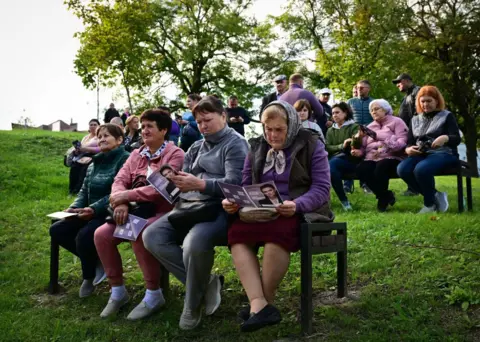 Getty Images
Getty ImagesPro-European forces in Moldova have long warned of Russian interference in the election and referendum vote.
Russia still has a military base in the breakaway Moldovan region of Transnistria along Moldova’s border with Ukraine, and there is also an autonomous Russian-speaking region called Gagauzia. The governor there, Eugenia Gutul, is an active supporter of Vladimir Putin and has been sanctioned by the EU for threatening Moldova’s independence.
One Moldovan news website said the election campaign had been marred by Russia’s “most slanderous, most violent and disruptive destabilisation campaign since the country’s independence”.
Authorities have linked some cases of vandalism and disinformation campaigns on social media to Shor and to his alleged Kremlin backers.
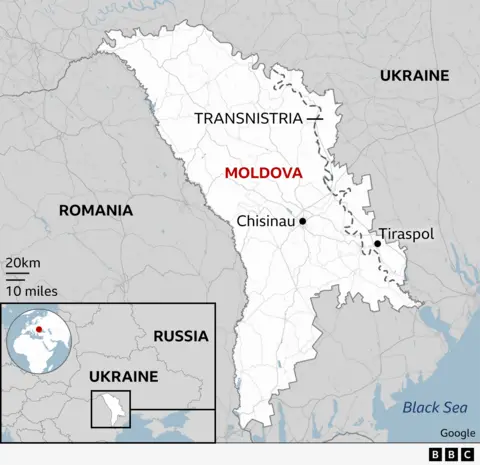
Last month, Moldova’s chief of police Viorel Cernauteanu said 130,000 Moldovans had received money transfers from Russia – amounting to $15m – as bribes to vote for Russia-friendly candidates and against the EU referendum.
On Thursday, Mr Cernauteanu alleged that dozens of Moldovans had recently travelled to Moscow, ostensibly to attend “cultural exchange programmes”, but actually receiving training to stir violence ahead of the elections.
The Kremlin maintains it “does not interfere in other people’s affairs” and has accused Moldova’s authorities of “denying many citizens a right to say that they support having good relations with Russia”.
Georgia’s pivotal vote
There is a lot of stake for Georgians when they vote in parliamentary elections on Saturday 26 October.
This country of 3.7 million people has become highly polarised – with the governing party, Georgian Dream, accused of dismantling civil society and adopting Russia-style laws.
Opposition parties, and Georgia’s pro-Western president, have sought to frame this vote as a choice between Europe and Russia – a label firmly rejected by Georgian Dream.
It was only last December that Georgians were celebrating the EU granting their country official candidate status, with polls suggesting support from at least 80% of Georgians.
By the summer, the EU had frozen that process, because of a Russia-style “foreign influence law” that brought tens of thousands of protesters onto the streets of the capital Tbilisi.
The law requires media and NGOs with foreign funding to register as acting in the interest of a foreign power. Since then Georgian Dream has also enacted a law curbing LGBT rights.
The EU and US have all issued warnings against backsliding from democracy. The EU’s ambassador in Tbilisi has warned it could temporarily suspend its visa-free regime with Georgia if the vote is not deemed free and fair. US President Joe Biden pointedly withdrew a recent invite to a reception to Georgia’s Prime Minister Irakli Kobakhidze.
Russia has accused the West of blatantly trying to put pressure on Georgia, denying that the Kremlin has itself has sought to do so.
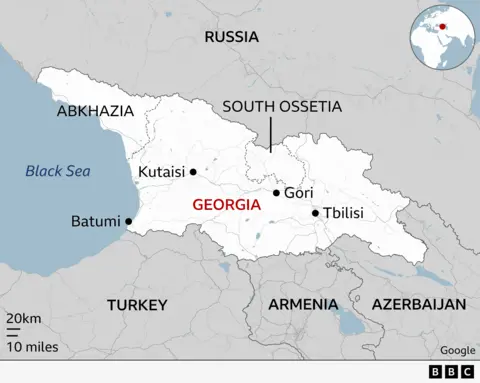
But Georgian Dream maintains it is still on the path to joining the EU.
The prime minister promises a reset in relations with the West, and EU membership by 2030, as well as deepening co-operation with Nato.
The party has been in power since 2012, and if Georgian Dream wins a fourth consecutive election, party founder Bidzina Ivanishvili, a billionaire who made his fortune in Russia, has promised to ban opposition groups. But to do that they would need three-quarters of the seats in the 150-seat parliament to change the constitution.
The opposition itself is far from united, so while Georgian Dream has declined in popularity it still leads in the opinion polls.
Four opposition groups have a chance of securing the 5% of votes needed to get into parliament.
The biggest – United National Movement or UNM – is also considered the most divisive. Many voters still have bad memories of its nine years in power before Georgian Dream took office, so the other three opposition forces have shied away from forming a united front.
Coalition for Change, Strong Georgia and Gakharia for Georgia are all polling well but even if the four groups were to find common ground it might take months to form a government, clearing the way for a period of instability.
Although Georgians will be voting for the first time under a proportional representation system, seen by most parties as fairer, critics have complained that the party in power still maintains a grip on the media and controls the public space.
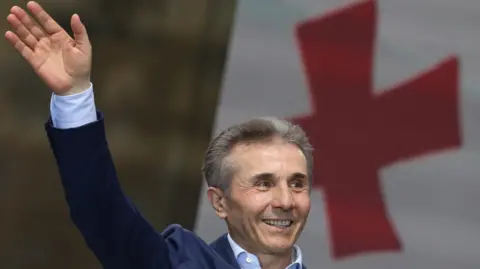 Reuters
ReutersSince Georgia lost a short war with Russia in 2008, the two breakaway regions of Abkhazia and South Ossetia which make up 20% of Georgian territory have been under effective Russian control.
Now, ahead of the election, the Kremlin has spoken of “normalising relations” with Tbilisi.
Georgia’s government has avoided imposing sanctions on Russia, and used election posters to cast the vote as a choice between the devastation of the war in Ukraine or peace under Georgian Dream.

